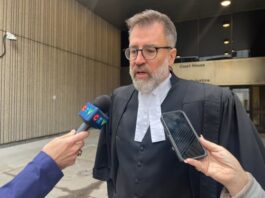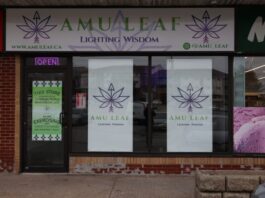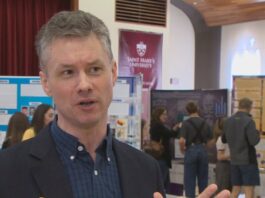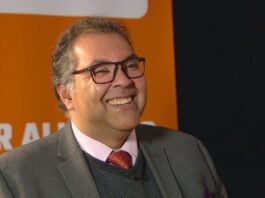
When Felicia Fahey heads to the ballot box June 2, her cousin, Steven Legault, will be top of mind. In September 2020, Legault died of an accidental overdose.
“It just rocked our entire family. He was just like a brother to me. … to see him succumb to something that was so preventable was just devastating,” said Fahey, who lives in Greater Sudbury.
For those touched by the opioid crisis, the toll of addictions and a toxic drug supply is a constant and growing concern. For many Ontarians — particularly those in the north — it is an important election issue as well.
“It’s something that can’t be put on the back-burner, or we’re going to go another four years seeing those numbers just keep rising and it just can’t happen,” Fahey said. “We have to have something done this year.”
Northern Ontario hardest hit
Opioid-related deaths continue to soar throughout the province, with northern Ontario hit particularly hard. The most recent numbers from the province’s chief coroner indicate that last year, 2,819 Ontarians died due to opioids, a figure that includes both confirmed and probable opioid-related deaths.
While the overdose crisis is affecting all parts of Ontario — and the country — the toll in northern Ontario is disproportionate. The six public health units with the most deaths per capita in 2021 were all in northern Ontario, with Thunder Bay at the top of the list.
Public Health Sudbury and Districts, which topped the list in 2020, saw a slight drop, with 100 probable and confirmed deaths in 2021, compared with 106 the year before.
“These are not numbers; these are human beings, these are members of our community that are no longer with us,” said Amber Fritz, a social service worker with Réseau Access Network in Sudbury.
Calls for investments in addictions treatment
Depending on who you ask, there are different views on the best way to address the opioid crisis. But those touched by it agree that massive investments are needed.
Felicia Fahey recalls how difficult it was to help her cousin access addictions treatment.

“It takes people that are suffering from addiction a hard enough time to ask for help. And then when they finally ask for help, they’re either not given help, they don’t know who to ask for help, or when they finally find those connections they’re told that we can get you into a rehab program in another year, or another eight months,” Fahey said.
She wants to see significant investments in mental health and addictions treatment, as well as more police enforcement to get drugs off the street.
At Monarch Recovery Services in Sudbury, chief executive officer Roxane Zuck said a recent $2.5 million in funding from the province for 15 new beds at Monarch will “make a huge difference for the individuals that we serve. But it’s just the tip of the iceberg.”

Here is some of what the main parties are pledging:
- Progressive Conservatives: An additional $204-million investment in mental health and addiction services.
- NDP: An immediate eight per cent funding boost to front-line mental health and addiction agencies, and targeted hospital funding to increase treatment beds for people with complex needs.
- Liberals: An additional $3 billion for mental health and addictions over four years, with $300 million specifically to prevent and treat opioid addiction and overdose.
- Green Party: Promises to increase mental health and addiction spending to 10 per cent of health budget.
Harm reduction
Many advocates are also calling for more investment and focus on harm reduction initiatives and policy. They say it’s important to recognize that some people will continue to rely on drugs, and that programs are in place to keep them safe.
The PCs, Liberals and Greens are all promising more distribution of naloxone, a fast-acting drug that can temporarily reverse the effects of an opioid overdose. The Liberals also promise more availability of fentanyl test strips.

At Réseau Access Network, Amber Fritz said the organization distributes “an astronomical amount of naloxone.” While it’s a valuable and important tool, it’s clear the illicit drug supply is becoming more toxic, she said.
On a personal level, she would like to see a safe drug supply program, which would mean providing a regulated supply of drugs to people who use them so they don’t have to rely on an unpredictable and toxic illicit market.
The Greens and NDP both said they will look at safer supply options. The NDP said it will work with the federal government to decriminalize personal drug use.
‘Where are our resources?’
The NDP, Liberals and Greens all promise more supervised consumption sites throughout the province, with the NDP and Liberals specifically promising to remove a cap put in place by the Ford government that limits the number of sites.
This week, Health Canada approved a federal exemption allowing a long-awaited supervised consumption site to open in Sudbury. Advocates, however, say more sites, and other supports, are needed in communities throughout the north.
“The communities that are suffering the most from the drug toxicity crisis are in northern Ontario,” said Karla Ghartey, a nurse and volunteer with the Sudbury Temporary Overdose Prevention Society (STOPS). “Where are our resources? There is one supervised consumption site, for example, north of Toronto, and that is in Thunder Bay. Why has it been taking so long for these things to move forward in our communities?”

STOPS formed in 2019, and has operated an unsanctioned site on and off since then. A group of volunteers were called to action by the urgency of the crisis, and they said it has saved lives.
Co-founder Marie Pollock hopes politicians from all parties will think of the human toll of the overdose crisis, and make significant policy changes, as well as investments in affordable housing, mental health services and harm reduction. For those unconvinced, she also has an economic argument.
“How much money are you spending on your courts, how much money are you spending on your 911 calls, and your ambulance, and your EMS, and your fire departments and your hospital visits? And by the way, how many dollars are you sending on mental health for the families that have to heal from the grief of losing somebody?”












